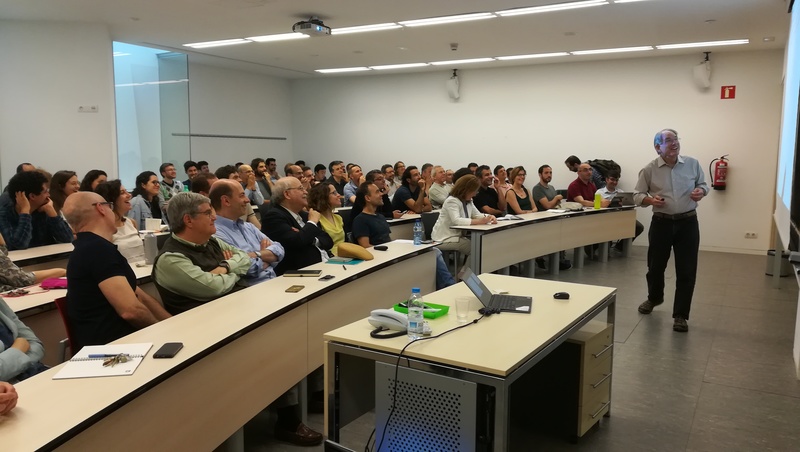Samuel Bowles lectures on economic inequality
-Me-Judice.jpg)
Samuel Bowles delivered the May 23, 2018, UPF Department of Economics and Business Departmental Seminar. In his lecture, Prof. Bowles presented research titled "The Origin and Future of Economic Inequality" to an audience of around 60 students and faculty members.
Prof. Bowles is a distinguished American economist and Professor Emeritus at the University of Massachusetts Amherst, and is a Research Professor at the Santa Fe Institute where he heads the Behavioral Sciences Program. He is known for taking economics outside of the traditional domain, and has published in a wide variety of scientific journals such as Science, Nature, Current Anthropology, and Behavioral and Brain Science, amongst others.
Throughout his career Prof. Bowles has pursued a number of research activities around the question of economic equality, striving to find out why it persists, what creates it, and what can be done about it. During his UPF lecture, Prof. Bowles referenced research from a working paper titled "Technology, Institutions, and Wealth Inequality Over Eleven Millennia", where he studied inequalities in material wealth over the past 11 millennia in economies with vastly different technologies and institutions.
Prof. Bowles presented the audience with a brief overview of the evolution of human society, from hunter-gatherer hierarchies to the rise of farming and landownership, and then to industrial economies. With the advent of farming, most things with economic importance became private property as wealth became concentrated enough to be owned and inherited. This trend continued into industrial capitalism, including commodities such as steel and grain. His research found that material and inheritable wealth, rather than human-capacity and relational wealth, has come to be unequally held, no less so in modern democratic and capitalist economies than in the societies of the past.
Finally he looked to the future and a web-like economy based on information. He noted that the current "steel and grain" economy – which values property in terms of weight and ownership – is being replaced by a "weightless" economy – which values relationships and human capacities. The novelty of a weightless economy is that human capital can become more relevant than material wealth in producing goods and services. This form of wealth – human capacities – can prevent the intensification of inequality because it cannot be owned, stored, or inherited as much as material wealth is.
The Departmental Seminar Series is a cycle of lectures delivered by world-reknowned economists. Previous departmental seminars in the 2017-18 academic year include Esther Duflo (MIT) this past April, and Andrei Shleifer (Harvard) last October.
Watch an earlier version of Prof. Bowles' lecture, delivered at the University of Massachusetts Amherst in 2016.
Find out more about Prof. Bowles at his personal website.

